What to Consider when Selecting a TOS operating system?

The role and importance of terminal operators is evolving quickly. Overall productivity and efficiency of terminals is becoming more important in the global competition. Carriers’ priorities vary when choosing ports and terminals and it’s not just a question of location. Terminals must find new ways to enhance productivity, bring more added value and optimize all their material and human resources. That’s why TOS operating system seek to help terminals in inventing tomorrow’s solutions thanks to real-time business solutions.
The choice of TOS operating system is a mission-critical piece of any terminal operation, and terminal operators should be thinking about which system would best optimize and update their port for now and the future.
Simply because it’s the industry standard, does not make the solution right for your terminal. Selecting a TOS is a long-term strategic decision for any operator. As an example, small to medium terminals need more flexible turn-key solutions and TOS operating systems should adjust their configuration to existing processes and business practices in a short amount of time. Every terminal has vital differences, which may be small or large, that’s why you should not buy the most expensive TOS and hope for the best result. For example, Small to Medium Terminals cannot afford to have many IT staff to look after software configuration. Thus, infrastructure must be simple, easy to operate and very robust.
Here are five factors to consider when selecting a TOS:
1. Turnaround times minimization
Terminals need to maintain a high level of productivity to keep shipping lines on schedule. You need to identify and address bottlenecks as they appear and minimize the impact of delays and disruptions. In this context, your TOS operating system should not only be designed to store data but also to help you make the best decisions for today and tomorrow. To this end, you need to access to performance indicators in real-time. A smart TOS uses ensures that your terminal always runs at its full potential.
2. Traffic capacity increasing
A great TOS operating system will give you more visibility into what’s happening at your terminal and will allow you to use data to make the most profitable decision. Indeed, a TOS should help you to create plans which reflect all vessel, port, compartment and container/cargo specifications and constraints. You should maintain an optimal operating schedule throughout the year in line with supply contracts and seasonal fluctuations. Capacity and storage capabilities of every vessel should be maximized. In other words, a smart TOS is a decision support and scenario planning system.
3. A TOS tailored to your needs
A TOS operating system provider should come with standardized software and configurations that scale your operations and operating processes. Design should give flexibility to meet your requirements and to adapt to your business progress.
4. Customer service improvement
One of the important features is that your TOS exchanges messages with all your stakeholders such as shipping lines, ports, customs and financial institutions. the TOS ought to facilitate and enhance communication between them. As an example, your consignees want to know where their containers are, Shipping lines need an EDI and your truckers need to be able to access to a timetable for the receipt and delivery of containers. So the messages may be related to the vessel, cargo, container, gate or billing – including IFMAN, BMISRM, HANMOV, COPRN, COPRAR, COARRI, CODECO, COPINO, COREOR, COSTO, etc.. and should be incorporated into the TOS.
5. Easy-to-use TOS interface
The TOS should be easily manageable by your operational staff. Indeed, Every person on your team should be able to quickly acquaint themselves with your TOS operating system and be able to teach their colleagues.
6. Take time to choose the best TOS operating System for your terminal
A smart TOS must be easily adopted, cost-effective, and able to be incorporated into your terminal’s regular operations quickly. It should empower you to remain competitive, secure high-profit margins and run at your maximum productivity levels at all times. Keep in mind questions like:
• What do you want to achieve? What is your target?
• Why are you considering this? Cost efficiency, customer service improvement, traffic capacity increase, expansion, modernization, etc.
• How would this system fit with your business?
Where will your terminal be in 5 years? Find out how OSCAR TOS can improve your efficiency in your terminal with a free demo.